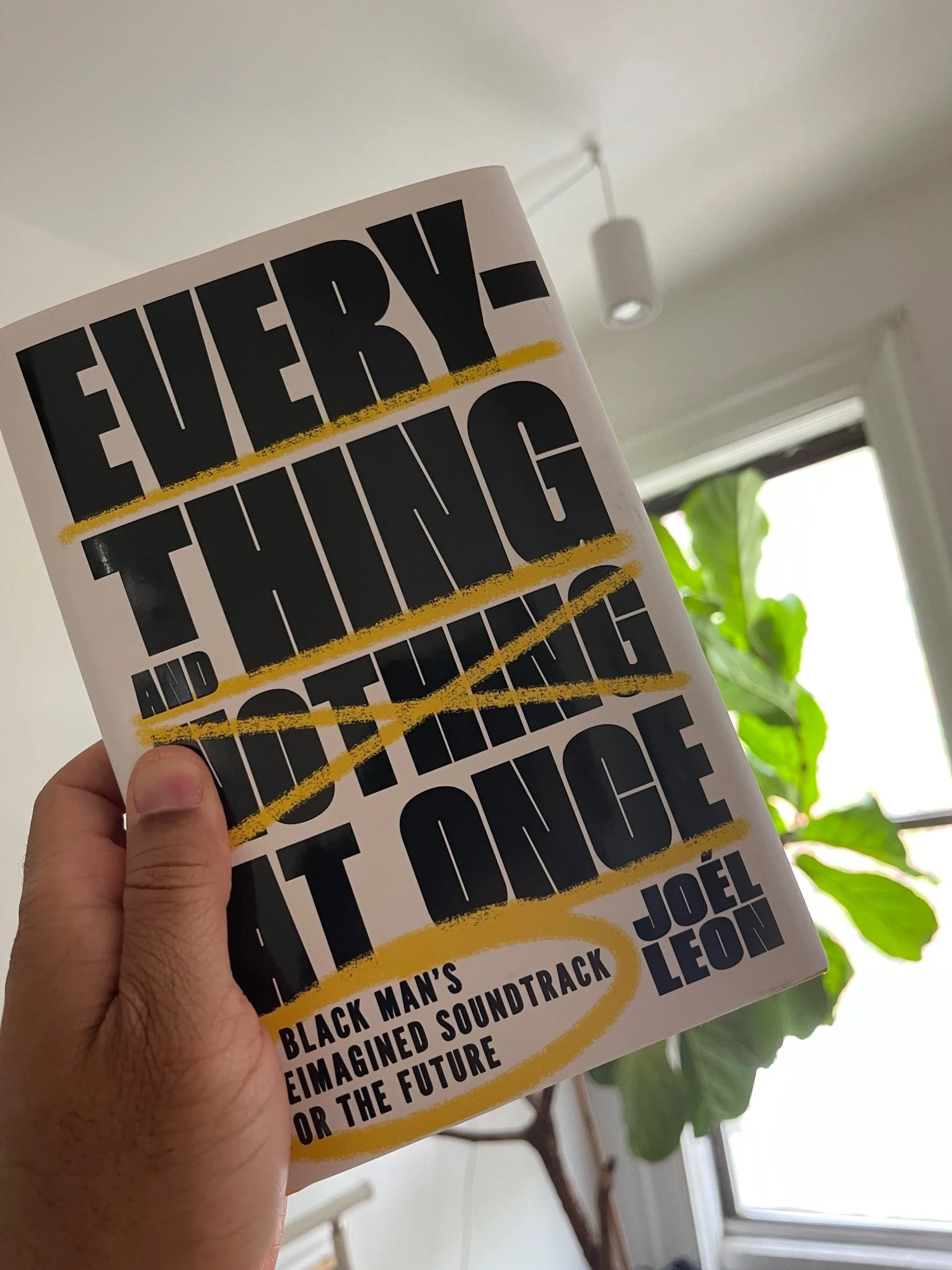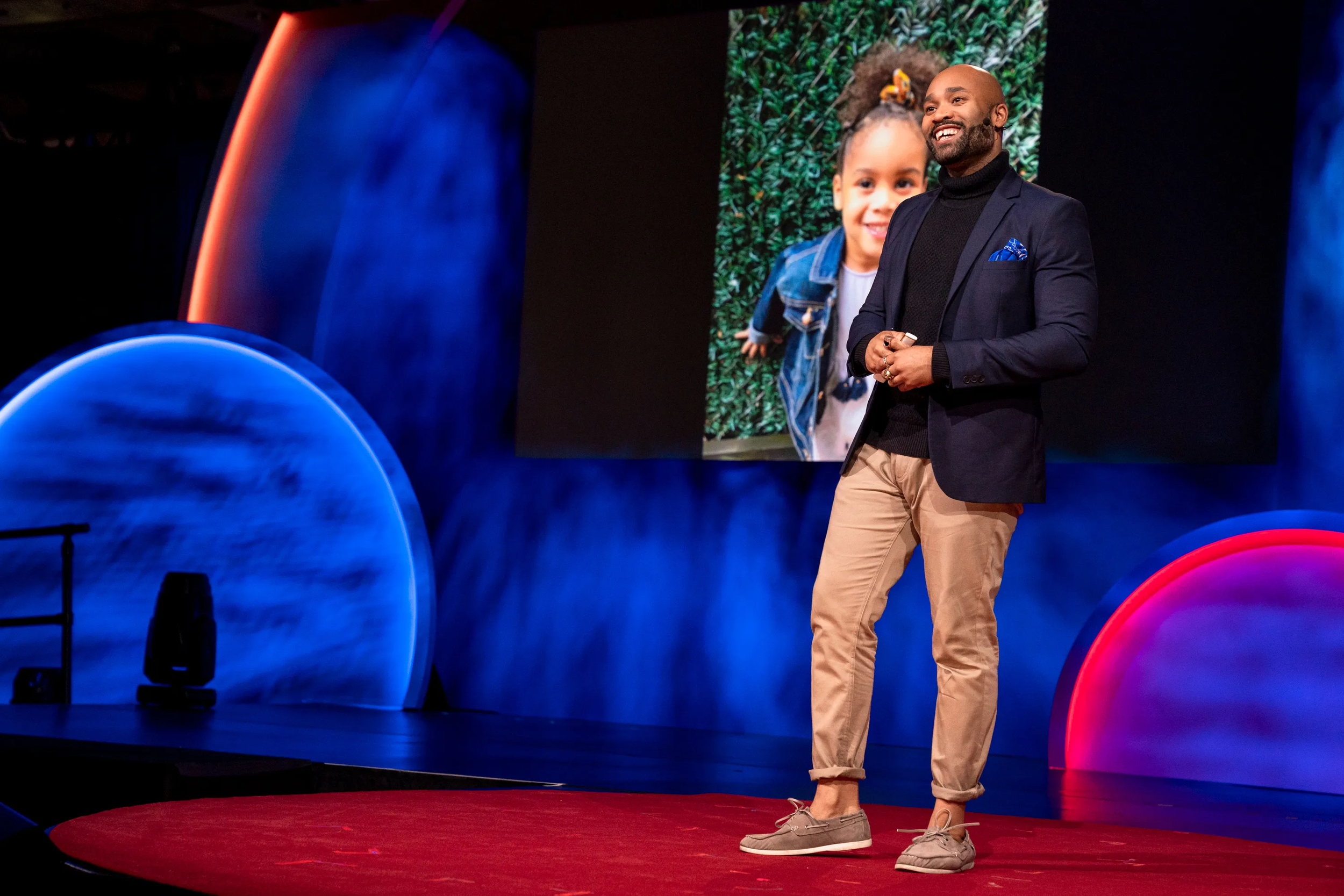Joél Leon is a Bronx-born author, poet, and storyteller who uses his voice to explore themes of Blackness, fatherhood, mental health, and love. His work has been featured by TED, The New York Times, and TIME, and he is known for blending vulnerability with powerful social commentary. Through performance and prose, Joél invites audiences to heal, reflect, and imagine more liberated futures.
You grew up emceeing in the Bronx. I’m going to ask you “Brown Sugar” most classic question, when did you fall in love with Hip Hop? And how did your love for language transition you into poetry as you were inspired by your high school teacher Ms.Petrowski?
JL: Dwayne “Dee” was kind of the entry point for me when it came to Hip Hop. I grew up in the Bronx, 188th and Creston Avenue, and just logistically from a geographical standpoint, Creston is like right off the Grand Concourse, which is a super busy hub of the Bronx. At the time when I was growing up, you'd have a lot of bootleggers, so you get a lot of the DJ mixtapes and stuff; there was a lot of activity there. Dee would get all the latest mixtapes—DJ Dirty Harry, Doo Wop, Kid Capri, Chuck Chuck—that was like Super Saiyan. There were a lot of folks in the DJ industry at the time who were not just blending songs and records, but also getting you the latest and greatest. A lot of that was me hearing and seeing that. Dee would go to work and he would make me tape Rap City for him and Video Music Box, which were two very pivotal, prominent shows for me when it came to Hip Hop and watching, and for whatever reason, it stuck.
Joél’s Book, “Everything and Nothing at Once” (All rights reserved to owner)
Before becoming a poet, author, and world-renowned Creative Director, you held a variety of roles, one including your time in the nonprofit sector. How did those experiences influence you to build your own platform? How did that pivot impact you emotionally?
JL: I worked in the nonprofit sector for about nine years. I was doing HIV/AIDS case management work—COBRA case management work at the time—for about two years, and this was relatively soon after college. I spent two years at Temple University, and prior to that, I had done some retail work. My grandmother had passed away from AIDS complications around that time, and I was working a retail gig. My man Frank was already working at the organization, and he was moonlighting part-time in retail because nonprofits don’t make money. He was like, “Yo Joel, I feel like you’d be really good for this role that we have up.” He had known about my grandmother. There was some clerical work involved, but more than anything, there was the compassion and the ability to talk to people—that was most important. So I was a community follow-up worker and a case management technician. Then from there, I made the pivot to discharge planner, so my primary work was with formerly incarcerated individuals and getting them placed into programs. I did that for about seven years before I made the transition into marketing and advertising, and much of that was about money. You have a high school diploma, you only have two years of college—no college degree—so what is really available to you? Much of the pivot was me just leaning into my skill sets at that time. By the time I was pivoting, I had built a pretty substantial Twitter following and I’d been writing a lot of essays. Writing led me to a social media management job because, essentially, those at least at the time didn’t even know what copy was. But it was hard—it was hard making that transition because I was also becoming a father for the first time. So much of that was me having to learn how to navigate this new industry while navigating fatherhood. I was living at my mom’s at the time and had moved back to the Bronx. I was starting to get my bearings together, and then I found out I was going to have a child. There was just a lot I had to process in that time. So yeah, it was hard but I mean, I wouldn’t change it for the world, if I’m being honest with you. I knew the pivot was necessary at the time, and it led me here.
“I think I realized that people were hungry for honesty and people wanted to see their own experiences mirrored”
- Joél Leon
You released “Everything and Nothing at Once” last June. With your work blending poetry, storytelling, and activism, how did you approach this creative process with those themes in mind?
JL: I signed with my agents during the summer of 2020. George Floyd had just been murdered, and I think publishing companies and agents were really opening their doors in a way they hadn’t before. We see this often—I mean, we’re seeing it now with the rise and then the dramatic rollback of DEI efforts—which, unfortunately, was expected. But at the time I signed with my agent, I had already been working—not on the book per se—but writing essays since around 2014, during the Ferguson uprisings. That was another pivot point for me: moving from being just an emcee and a poet to becoming an essayist. Part of that came from witnessing what was happening on the ground in Ferguson and realizing that writing songs didn’t give me the freedom I needed to fully express what I was seeing. The energy of that moment called me to long-form essay writing.
I had a couple of false starts. One agent ghosted me. Another felt my writing was too prosaic, too close to poetry, and pushed me to write a memoir. I turned that offer down, and it was honestly a depressing moment because I had envisioned this clear path—I was following Toni Morrison’s trajectory in my head: get an agent, sign a book deal, see my book in bookstores. I didn’t want to go the self-publishing route. No shade to those who do—I admire it—but I’d already lived that hustle when I was making hip hop music, selling it out of the trunk. I wanted a team, support, and to go through what felt like the legitimate process of becoming a published author. It wasn’t even about the money. A lot of my writing centered on Lila and was about processing fatherhood in a time of racial tension.
The activism and the writing came naturally—it was me practicing what I’ve been learning: the art of vulnerability. I’d be remiss not to mention that the more vulnerable, honest, and transparent I became—especially online—the more my platform grew. People were hungry for honesty. They wanted to see their own experiences reflected, and I knew there wasn’t anyone with my exact language, background, and way of showing up. So it felt important to incorporate every part of myself into the book. And doing so was a beautiful experience, to say the least.
Joél speaks at TED, December of 2019 (All rights reserved to owner)
What guidance would you offer to Black men on embracing honesty and vulnerability, and how can openly sharing their experiences lead to a deeper, more meaningful impact?
JL: I think, first, we have to create safe enough spaces for Black men to feel like they can be vulnerable without being judged or having their masculinity questioned. So often, when a Black man says, “Hey, I feel like this” or “I want this,” it’s met with fears that our men are being softened. But what I always remind folks is: where there’s a soft man, there’s a healthy man. That softness is really about taking the time to learn ourselves. I’ve been leading a men’s writing and wellness workshop here in Brooklyn, and in our first session, I asked them, “What does it mean for you to feel safe?” And the first three responses were, “No one’s ever asked me that question before.” That’s the foundation of everything. When we think about safety as men, we usually think about protecting, providing, or physical strength—but if you’re not emotionally safe for someone, that’s just as unhealthy. And to get there, you first have to be a safe space for yourself. You have to know what safety feels like in your own body, what it looks like to you, so you can model it. That includes setting healthy boundaries, having the language, and being aware of when you’re not showing up as a functional human being—being able to love, to be intimate, to be present. My ask, especially for Black men, is to stay open and curious about our experiences. Vulnerability has to be practiced. It won’t come easy, and you’re not going to get it right on the first, second, or even fifth try—but it’s about getting those reps in. The more we recognize those opportunities when they come up, the better we get at embracing them.
What role does representation play in helping the next generation believe that their dreams and aspirations are truly possible?
JL: Representation is phase one. Being able to see someone modeling a career or a life that you want is incredibly important—but it doesn’t stop there. You also have to try to embody it while recognizing that your path is going to be uniquely yours. My story is my story, and while I hope it inspires someone, I don’t necessarily want to inspire the next creative director. If my story moves you to become a community organizer or if my poetry motivates you to get your mama out the hood—I'm here for that. I want my representation to mean more than just checking a box. I want it to have real impact—not just encouraging the next generation to show up in these roles, but empowering them to fundamentally change the world and dismantle broken systems. That brings me to phase two: we have to pull people up. We have to educate them and recognize that landing the cushy job—whether as a doctor, lawyer, creative director, whatever—is great and can bring financial stability, but that alone doesn’t change the system. So we have to be intentional about how we take what feels like representation and turn it into real transformation. We need to be thinking bigger and broader.
Want to hear more amazing stories like this? Check out our “More of Us” series! If you want to connect with Joél and support the work he is doing, follow him on social @iamjoelleon and support his work Everything and Nothing at Once.



